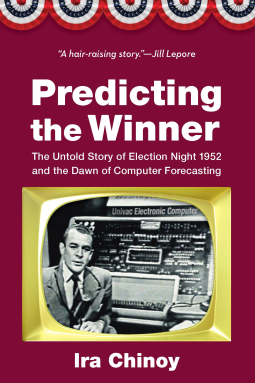
Predicting the Winner
The Untold Story of Election Night 1952 and the Dawn of Computer Forecasting
by Ira Chinoy
This title was previously available on NetGalley and is now archived.
Send NetGalley books directly to your Kindle or Kindle app
1
To read on a Kindle or Kindle app, please add kindle@netgalley.com as an approved email address to receive files in your Amazon account. Click here for step-by-step instructions.
2
Also find your Kindle email address within your Amazon account, and enter it here.
Pub Date May 01 2024 | Archive Date Apr 30 2024
University of Nebraska Press | Potomac Books
Talking about this book? Use #PredictingtheWinner #NetGalley. More hashtag tips!
Description
Winner of the Ray Hiebert History of Journalism Published Work Award
Winner of the 2025 Eugenia M. Palmegiano Prize in the History of Journalism
The history of American elections changed profoundly on the night of November 4, 1952. An outside-the-box approach to predicting winners from early returns with new tools—computers—was launched live and untested on the newest medium for news: television. Like exhibits in a freak show, computers were referred to as “electronic brains” and “mechanical monsters.”
Yet this innovation would help fuel an obsession with numbers as a way of understanding and shaping politics. It would engender controversy down to our own time. And it would herald a future in which the public square would go digital. The gamble was fueled by a crisis of credibility stemming from faulty election-night forecasts four years earlier, in 1948, combined with a lackluster presentation of returns. What transpired in 1952 is a complex tale of responses to innovation, which Ira Chinoy makes understandable via a surprising history of election nights as venues for rolling out new technologies, refining methods of prediction, and providing opportunities for news organizations to shine.
In Predicting the Winner Chinoy tells in detail for the first time the story of the 1952 election night—a night with continuing implications for the way forward from the dramatic events of 2020–21 and for future election nights in the United States.
Advance Praise
“In Predicting the Winner, Pulitzer Prize–winning investigative-journalist-turned-historian Ira Chinoy tells the hair-raising story of the first widely televised U.S. presidential election, in 1952. But it wasn’t only televised. It was computerized. With predictions made by robots and whirring, blinking, flashing machines. Based on stunning archival research, the tale offers a vital parable for our times.”—Jill Lepore, author of These Truths: A History of the United States
“A fascinating, thoroughly researched account of how the electronic computer muscled its way into our consciousness during the 1952 presidential election, when both the computer and the medium of television were new. Some of the ways established veteran journalists wrestled with their relationship to the ‘giant brain’ are amusing, but in light of recent events, perhaps the joke is on us. You are guaranteed to have fun reading it.”—Paul Ceruzzi, coauthor of A New History of Modern Computing
“This well-researched book is a road map for practices that served as a foundation for election-night reporting up to our own time. And perhaps most important, it shows the challenges faced by pollsters and prognosticators when predicting how an election night will turn out, even in today’s world of AI and vastly more powerful predictive models than those first tried out decades ago.”—Jack Speer, newscaster, NPR
“The year 1952 was an inflection point in American culture—the introduction of computers, projections, and even TV news into our election nights. In this insightful and immensely readable telling of the tale, historian and journalist Ira Chinoy explains how the innovations came about and how they are relevant to our current times. This is a book for anyone who cares about politics, thinks about technology, and wants to know where we are going by understanding where we have been.”—Tom Rosenstiel, coauthor of The Elements of Journalism
“Election night in the United States is the most prominent and fraught intersection of politics, technology, and culture. Ira Chinoy’s deeply researched and beautifully narrated account of computers and television in their shared infancy explains how this came to be and why it is so important to understand.”—Robert Friedel, author of A Culture of Improvement: Technology and the Western Millennium
“Election night on television is dominated by touch-screen maps and other technological wizardry. Predicting The Winner takes us back to when computers made their infamous debut in forecasting the next president on national television. Ira Chinoy uses the researching and reporting skills that won him multiple Pulitzer Prizes to dig out this important but mostly untold moment.”—Mike Conway, author of Contested Ground: “The Tunnel” and the Struggle over Television News in Cold War America
Available Editions
| EDITION | Other Format |
| ISBN | 9781640125964 |
| PRICE | $38.95 (USD) |
| PAGES | 384 |
Links
Available on NetGalley
Average rating from 1 member
Featured Reviews
 Linda P, Reviewer
Linda P, Reviewer
Computer "brains" used to forecast the outcome of the 1952 Eisenhower/Stevenson presidential election. Not something I'd ever thought about but this look at early computers and how the TV networks used them on election night 1952 to forecast the winner is an absolutely fascinating look at a little known piece of American history.
The TV news industry cautiously stepped into the future using these brains and this book looks at the computer industry at the time and how the networks moved forward on this. Mistakes they made (for instance, the network didn't trust what the computer said) and were learned from for the future.
Thankful that the author was able to dig out the minutiae from the dustbin of history and present this informative look. Also interestingly, the author briefly looked at the use of technology in later American elections, including the 2020 election.
An excellent read!!



